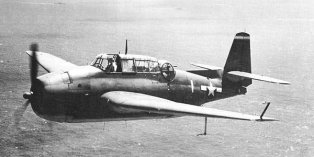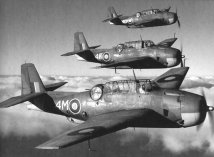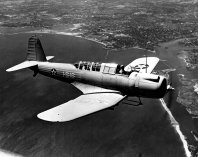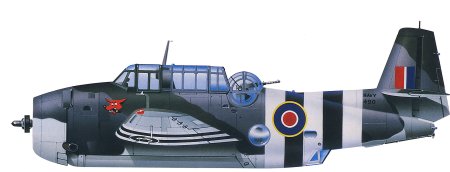
Home »
USA » Grumman TBF/TBM Avenger
Grumman TBF/TBM Avenger
Grumman Iron Works was a nickname for the company that designed the Avenger. Grumman created shipboard aircraft that were sturdy, heavy and tough. When it replaced the inadequate Douglas TBD Devastator as the US Navy's torpedo bomber in the Pacific, the Grumman Avenger had the strength and power to do the job.
However, as Grumman was busy fulfilling large orders for fighters, the job of constructing the bulk of the Avenger order was subcontracted to the Eastern Aircraft Division of the General Motors Corporation.
Despite a poor start at the 1942 Battle of Midway, the Avenger performed superbly through to the end of the war and in addition to torpedo bombing, took on other roles including close air support of ground troops.
The Avenger was pleasant to fly, although spinning was prohibited. When flown with determination by a strong pilot, it could almost turn like a fighter, hence its single and later twin, forward-firing gun armament. Britain (921 aircraft) and New Zealand (63) also used Avengers during the war. Canada, France, Japan and Netherlands employed it after 1945.
Grumman's portly TBF Avenger (built by Eastern Aircraft as the TBM) was the most important American torpedo-bomber of World War II. Big, noisy and powerful, the Avenger flew from carrier decks and spanned vast Pacific distances to attack the Japanese Navy with its torpedo or bombs. The Avenger had staying power, with many Allied nations using the type long after the war. US Navy Avengers were still on hand for transport duty in the Korean War.
 |
 |
 |
| For a single-engined aircraft the TBM was fairly big. The same engine was fitted to the B-25 Mitchell bomber. |
This TBF-1 (Avenger Mk I) flew with the Fleet Air Arm's No. 846 Squadron. FAA aircraft were carrier and land based. |
To provide early warning protection for USN carriers the TBM-3W, with its large radome, entered service after the war. |
|
Grumman TBF/TBM Avenger (Technical Specification) |
| Role |
Three-seat carrier based torpedo bomber |
| Manufacturer |
Grumman |
| Maximum Speed |
436 kmh (270 mph) |
| Maximum Range |
1,778 km (1,100 miles) |
| Ceiling |
6,830 meters (22,400 feet) |
Weight
Empty
Maximum Takeoff |
4,788 kg (10,534 lbs)
7,876 kg (17,327 lbs) |
Dimensions
Wingspan
Length
Height
Wing Area |
16.51 meters (54 ft 2 in)
12.20 meters (40 ft)
5.00 meters (16 ft 5 in)
45.52 square meters (490 sq ft) |
| Engines |
One Wright R-2600-8 Cyclone 14-cylinder radial piston engine which provides 1,268-kW (1,700 hp) |
| Armament |
Two fixed forward-firing 12.7 mm (0.50 cal) machine guns
One 12.7 mm machine gun in rear turret
One 7.62 mm (0.30 cal) machine gun in ventral position
907 kg (2,000 lbs) of bombs or one torpedo in internal bomb-bay |
Photo Gallery
Click here to submit your photo
| Have A Passion For Aircraft? |
Subscribe to our 14 series FREE newsletter
delivered weekly on World War 2 Aircraft factfile... |
| NB:- We hate spam as much as you do, so your email address will NEVER be shared with or sold to anyone else. That's a Guarantee. |
|
|





